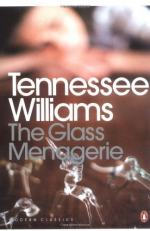|
|
The Glass Menagerie Part 1, Scene 1
Tom enters in merchant sailor dress, and strolls over to the fire escape where he stops and lights a cigarette. He explains directly to the audience that he's turning time back to the '30's in America when the economy was crumbling and labor disturbances bred discontent in otherwise peaceful cities, including St. Louis, where the play is set. Tom tells the audience that the play is a memory play, and therefore has certain unrealistic qualities about it, including the music and the sentimental lighting. He introduces himself as the narrator and a character. He then introduces the other characters -- his mother Amanda, his sister Laura, and the gentleman caller. The gentleman caller is defined as most realistic character in the play; Tom's family seems somehow set apart from reality. The gentleman caller is not merely the link to reality; he is also a symbol of the "long-delayed but always expected something that we live for." Part 1, Scene 1, pg. 5
Tom also talks about the fifth character in the play who never appears, his father. The only vestige of Mr. Wingfield that appears in the play is the enlarged and smiling photograph which hangs on the living room wall; he left sixteen years before the action of the play takes place. He was "a long distance man who fell in love with long distances." Part 1, Scene 1, pg. 5 The only correspondence they'd had from him since he left was a postcard from Matzalan, Mexico that simply said, "Hello -- Goodbye!" Part 1, Scene 1, pg. 5 Tom, as the narrator, says that the rest of the play is self-explanatory.
Topic Tracking: Escape 1
Topic Tracking: Expectation 2
The screen legend reads, "Ou sont les neiges," which means, "where are the snows." Amanda's voice calls to Tom from the softly lit dining room where she and Laura are seated at the table waiting for him to join them. From his fire escape perch, Tom bows to the audience and exits, only to reappear moments later in his place at the dinner table. Amanda's chair faces the audience while Tom and Laura are seated in profile as they mimic the motions of eating without food or utensils. Amanda nags Tom about the way that he's eating -- he's using his fingers rather than a crust of bread to push his food onto his fork, and he's not chewing slowly enough to suit her. At her correction, Tom lays down his imaginary fork and in response to her nagging, pushes himself away from the table in an outburst. She makes light of his annoyance and he leaves the table to walk toward the living room. Amanda, still prodding at him about manners, reminds him that he has not been excused from the table, and he answers that he's getting a cigarette. This spawns a whole new set of criticisms from her about how he smokes too much.
Laura, having said nothing, rises from the table awkwardly to get the dessert, but her mother insists that she sit down and stay fresh for the gentleman callers that would no doubt begin arriving soon. Laura asserts that she isn't expecting any callers, but Amanda insists, before walking offstage into the kitchenette, that gentlemen callers show up when they're least expected as they did one Sunday when she was a girl in Blue Mountain. While she's offstage, Tom grumbles that he already knows what's next, but Laura urges him to just let Amanda tell her story because it makes her happy to do so. Amanda comes back in with the dessert and tells her children how when she was a young girl in Blue Mountain she had seventeen gentlemen callers in one Sunday afternoon -- so many that they had to bring in folding chairs from her father's parish. An image of Amanda as a girl greeting her callers on a porch flickers on the projection screen. Tom, going along with the well-known story, asks how she entertained them. Her response is that she understood the art of conversation. As she talks, she addresses Tom's seat at the table although he's at the living room doorway. Tom motions for music and directs a spotlight to Amanda's face as she discusses her numerous gentlemen callers and their whereabouts. The screen legend says, "Ou sont les neiges d'antan?" which translates: "Where are the snows of yesteryear?" Tom responds to Amanda's story as if he's reading from a script; he is bored with his role in this redundant conversation.
Laura gets up from the table to clear the dishes, but Amanda sends her into the living room to practice her typing and to wait for the gentlemen callers to arrive. Amanda, bouncing into the kitchenette, babbles about how many callers will stop by today, and Tom throws his paper down in disgust and leaves for the living room with a groan. Laura, alone in the dining room, tells her mother that none will stop by, and Amanda reappears suggesting that there must have been a flood or some other natural disaster to prevent them from coming over. Laura, slipping through the gauzy curtains and into the living room, is bathed in a clear spotlight as "The Glass Menagerie" music plays faintly in the background. She assures her mother that there was no natural disaster, only that she's not as popular as Amanda was in Blue Mountain. Tom groans again, and Laura looks at him almost apologetically and her voice catches as she tells him that their mother is worried that Laura will be an old maid. The scene dims out with "The Glass Menagerie" music.
Topic Tracking: Disappointment 1
Topic Tracking: Expectation 4




